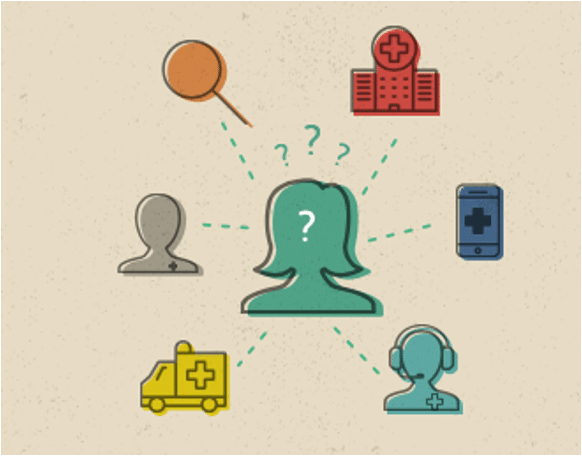When patients call your practice for advice about their symptoms, how do you make sure that your nurses give them the correct dispositions for care? For example, when a patient calls for a prescription refill, are they also experiencing symptoms? TriageLogic is developing a new tool for nurses that will guide them through this process so that nurses choose the most appropriate protocols and triage dispositions for patients to receive the best levels of care. Known as Triage Assist, this powerful new module will help practices like yours improve patient outcomes, reduce clinical errors, and generate higher staff satisfaction.
Triage Protocols and the 6 Dispositions of Care

Nurses determine patient dispositions over the phone by using nurse triage protocols, which evaluate patient symptom severity. Most healthcare practices use protocols developed by Drs. Barton Schmitt and David Thompson. These offer a series of yes/no questions that help nurses discern which disposition level each patient falls under, whether it’s:
911. The patient should hang up and immediately dial emergency services.
Urgent. The patient should be instructed to go to the nearest emergency department or urgent care.
Follow Up Within 24 Hours. The patient is advised to contact their primary care physician within a day.
Follow Up After 24 hours. The patient is advised to contact their primary care physician soon.
Home Care. The patient is advised that they can treat their symptoms at home, although they may also wish to follow up with their PCP.
Other. The patient may need to contact other local agencies or get tests ordered.
Triage Assist makes it easier for nurses to verify that they’re choosing the right protocol and, by extension, generating the right disposition.
Introducing Triage Assist
Triage Assist uses medical scripting and predictive analytics to guide nurses through the decision-tree of yes/no answers to make sure that all relevant, associated symptoms are accounted for. Once all symptoms are addressed, the program suggests the best protocols for nurses to use to evaluate each patient.
Why is this important? For example, consider a patient who calls in to complain about a mild cough. If the responding nurse doesn’t dig deeper to learn about other potential symptoms — like severe vomiting and diarrhea — then the nurse may miss dehydration and choose the incorrect protocol.
Triage Assist improves the accuracy of patient symptom review because it allows nurses to double-check their work in real time. It is important to note that the system does not give nurses answers or force them down specific paths of care. It merely helps them collect the correct information and suggests possible approaches.
Additional AI Solutions From TriageLogic
It’s worth noting that this tool is similar in design to other AI “Assist” solutions that our team has released over the past year. Quality Assurance (QA) Assist automates the quality assurance process by generating a report on all common and urgent symptoms, while History Assist helps nurses summarize patient symptoms in narratives that are structured for physicians to read.
Why Triage Assist Is Necessary
There are a few key interactions between patients and providers where information can be lost, misinterpreted, or insufficient: when patients first call in to speak with nonclinical operators and submit their requests; when triage nurses call those patients back; and when nurses update providers about patient symptoms and their questions. While MedMessage Assist™ helps nonclinical staff ensure the accuracy of medical message intake, our additional Assist modules alleviate concerns during these other interactions.
This is important because, according to some reports, “[a]t least half of EHRs may contain an error,” while “systems for checking the accuracy of notes are almost nonexistent.” To improve those statistics, our tools offer several key benefits for telephone triage and medical care:
- They help your staff ensure accurate, clear messages.
- They improve patient health outcomes.
- They reduce expenses for nurse training.
- They help patients avoid unnecessary doctor visits.
- They enhance internal team confidence and coordination.
Sign Up for a Trial of Triage Assist
If you’re interested in a trial of our Triage Assist solution, we would love to hear from you! Contact us today to learn more about how it works, as well as details about your customized program.
About TriageLogic
TriageLogic is a URAC-accredited, physician-led provider of top-quality nurse telehealth technology, remote patient monitoring, and medical call center solutions. Founded in 2007, the TriageLogic Group now serves more than 22,000 physicians and covers over 42 million lives nationwide.





